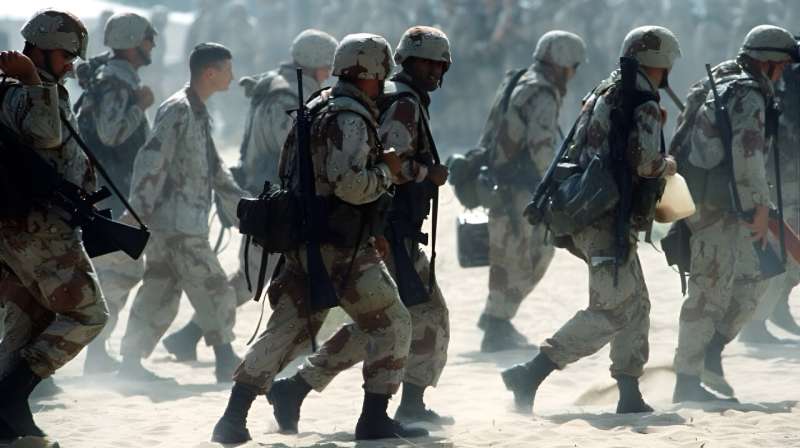This article has been reviewed according to Science X's editorial process and policies. Editors have highlighted the following attributes while ensuring the content's credibility:
fact-checked
peer-reviewed publication
trusted source
proofread
Gulf War Illness significantly reduces white blood cells' ability to make energy, study finds

A new Duke University-led study finds that Gulf War Illness (GWI), which affects approximately 250,000 U.S. veterans, significantly reduces their white blood cells' ability to make energy and creates a measurable biochemical difference in veterans who have the disease.
"Historically, GWI has been diagnosed based on a veteran's self-reported symptoms, such as exercise-induced fatigue, indigestion, dizziness, insomnia, or memory problems. There's been no objective biochemical or molecular measurements doctors could use to diagnose it," said Joel Meyer, professor of environmental genomics at Duke's Nicholas School of the Environment, who led the new study.
The new study provides measurements accessible in blood samples, which, though not sufficient to serve as a stand-alone diagnostic test, could be useful to help improve treatment for veterans suffering from Gulf War Illness by giving doctors a new way to assess whether a prescribed treatment is helping, Meyer said.
"Knowing this is an energetic deficiency can help us zero in on more effective ways to relieve the symptoms," Meyer said. "Blood tests, repeated over the course of the treatment, would show if a veteran's white blood cells are responding to a treatment and producing more energy."
He and his co-authors from Duke, the U.S. Department of Veteran Affairs' War-Related Illness and Injury Study Center, and the New Jersey Medical School published the new paper in PLOS ONE.
Their research reveals that Gulf War Illness inhibits white blood cells' energy production by impairing the workings of the cells' mitochondria, structures within the cell which extract energy from food and convert it into the chemical power needed to fuel growth, movement and other bodily processes and functions.
"The idea to investigate the role mitochondria might be playing in GWI came from Mike Falvo, one of my co-authors from Veteran Affairs and the New Jersey Medical School, who had noticed that a lot of GWI symptoms were similar to those associated with mitochondrial diseases," said Meyer.
"So, we analyzed mitochondrial respiration and extracellular acidification, which are proxies for energy generation, in the white blood cells of 114 Gulf War veterans, 80 of whom had been diagnosed with GWI. We also looked for evidence of mitochondrial DNA damage and nuclear DNA damage."
The analyses revealed no evidence of DNA damage, but they did show significantly lower levels of extracellular acidification and oxygen consumption in the white blood cells from veterans with GWI—signs that their mitochondria were generating less energy.
Follow-up blood tests on about a third of the veterans showed that some of these levels could vary over time, but the general pattern remained: the cells of veterans with GWI produced less energy.
The cause of Gulf War Illness is still unknown. To determine if environmental factors might play a role, Meyer and his colleagues turned to the veterans' surveys of self-reported symptoms and their written recollections of their deployments.
"We found veterans who recalled being exposed to pesticides and pyridostigmine bromide, a drug used during the Gulf War as a pretreatment to protect troops from the harmful effects of nerve agents, were more likely to get GWI after deployment," Meyer said. "An interesting question is how these effects have persisted so long after the exposures."
More information: Bioenergetic Function is Decreased in Peripheral Blood Mononuclear Cells of Veterans with Gulf War Illness, PLoS ONE (2023). DOI: 10.1371/journal.pone.0287412





















